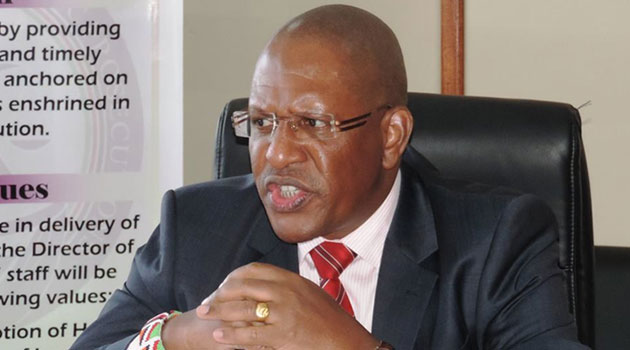
DPP has declined to charge suspects whose names have been forwarded by the EACC citing insufficient evidence or in other instances, the EACC has recommended closing of suspects’ files but Tobiko has ordered for further investigations/FILE
NAIROBI, Kenya, May 24 – Director of Public Prosecutor Keriako Tobiko has opposed the push for investigative bodies like the Ethics and Anti-Corruption Commission (EACC) to be granted prosecutorial powers, saying it goes against separation of functions.
He told the National Assembly Justice and Legal Committee that prosecution should be left solely to his office if high prosecutorial standards are to be maintained.
“Don’t overload the EACC and create a Frankenstein monster, it is already overwhelmed and you want to give it more powers. Why can’t EACC perfect in its own mandate instead of looking at what belongs in another institutions?” Tobiko asked.
“I hear this argument sometimes that even municipal councils used to have prosecutorial powers to charge those vagabonds, those drunk and disorderly fellows but for Christ’s sake, corruption and economic crimes cannot be compared to labour matters, NSSF and environment matters that can be handled by the municipal authorities; because they are very complex, highly politicized and you all know it very well.”
Deputy DPP Dorcas Odour added to the debate saying that Parliament should instead seek to strengthen the ODPP and protect its independence.
“One of the main attributes of the office is independence in decision-making and mainly its independence from political influence. The office of the EACC falls under the Attorney-General, then the AG who was the prosecutor, sat in Parliament as an ex-officio member and was a member of the Cabinet and therefore he was not independent because it was seen and he could be influenced.”
“Giving prosecutorial powers to the EACC is giving prosecutorial powers through the back door to the AG who is still a member of the Cabinet and I don’t see how that independence from interference would come in,” Oduor cautioned the MPs.
Temporary Session Chair Boniface Otsiula (Bumula), Agostinho Neto (Ndhiwa) and David Ochieng (Ugenya) supported his stand citing that while the Constitution allows other bodies to be given prosecutorial powers through an Act of Parliament, the supreme law also advocates for a separation of the powers of prosecution and investigation.
Currently, the EACC investigates officials linked to corruption and forwards its findings to the DPP who weighs the evidence and decides whether to move to court or not.
In multiple cases, the DPP has declined to charge suspects whose names have been forwarded by the EACC citing insufficient evidence or in other instances, the EACC has recommended closing of suspects’ files but Tobiko has ordered for further investigations.









































